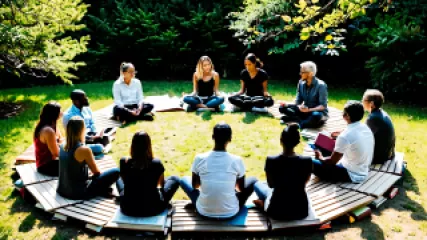Exploring the Connection Between Philosophy and Psychology for Self-Improvement
Introduction
Philosophy and psychology are two disciplines that may seem distinct at first glance. Philosophy deals with abstract concepts, values, and the nature of knowledge, while psychology focuses on understanding human behavior and the mind. However, these two fields have a deep connection that can be explored for self-improvement.
Understanding the Relationship
Philosophy and psychology intersect in many ways, as both disciplines seek to understand the human experience and provide insights into the complexities of our thoughts, emotions, and actions. By delving into the principles of philosophy and applying psychological theories, we can gain valuable insights into ourselves and the world around us.
1. Existentialism and the Search for Meaning
Existentialism, a philosophical movement that emerged in the 20th century, examines the individual's search for meaning and purpose in life. This branch of philosophy emphasizes personal freedom, responsibility, and the importance of subjective experience. By drawing from existentialist ideas, we can explore questions about our own existence and find ways to live more authentically.
Psychology complements existentialism by offering empirical evidence and practical tools to navigate the search for meaning. Positive psychology, for example, focuses on well-being, fulfillment, and the cultivation of positive emotions. By combining existentialist philosophy with psychological techniques, we can develop a deeper understanding of ourselves and align our actions with our values and aspirations.
2. Stoicism and Emotional Resilience
Stoicism is an ancient school of thought that teaches individuals to cultivate resilience, emotional balance, and inner strength. It emphasizes the importance of accepting what is beyond our control and focusing on our response to external events. By adopting stoic principles, we can learn to manage stress, cope with adversity, and cultivate a sense of tranquility.
Psychology offers evidence-based strategies to develop emotional resilience and cope with challenging situations. Cognitive-behavioral therapy (CBT), for instance, helps individuals identify and challenge irrational thoughts that contribute to negative emotions. By integrating stoic philosophy with psychological techniques, we can build emotional resilience and navigate life's ups and downs with greater ease.
3. Ethics and Moral Decision-Making
Philosophy has long grappled with questions of ethics and moral decision-making. Ethical theories provide frameworks for evaluating the rightness or wrongness of our actions and guide us in making choices that align with our values. By reflecting on ethical principles, we can cultivate a stronger sense of integrity and make more informed decisions.
Psychology contributes to this exploration by shedding light on the factors that influence our moral judgments and behavior. Social psychology, for example, investigates how societal norms and situational factors impact our ethical choices. By combining philosophical ethics with psychological insights, we can develop a more nuanced understanding of our own moral compass and make ethical decisions that are congruent with our values.
Applying Philosophy and Psychology to Self-Improvement
Now that we understand the connection between philosophy and psychology, let's explore some practical ways to apply these insights for self-improvement:
1. Reflect on Existential Questions
Take time to reflect on existential questions such as the meaning of life, your purpose, and what truly matters to you. Engage in journaling or deep conversations with trusted individuals to gain clarity and deepen your understanding of yourself.
2. Practice Emotional Awareness
Develop emotional awareness by paying attention to your feelings and thoughts. Notice patterns and triggers that lead to certain emotions. Use techniques such as mindfulness meditation to cultivate a non-judgmental attitude towards your emotions and develop emotional resilience.
3. Cultivate Virtues
Study ethical theories and identify virtues that resonate with you. Strive to cultivate these virtues in your daily life, whether it's practicing kindness, honesty, or patience. Reflect on your actions and assess whether they align with your chosen virtues.
4. Seek Psychological Counseling
If you find yourself struggling with mental health issues or facing significant challenges, consider seeking psychological counseling. A trained therapist can help you navigate these difficulties and provide valuable guidance based on both philosophical and psychological insights.
5. Engage in Empathetic Listening
Practice empathetic listening by truly hearing and understanding others without judgment. This skill not only strengthens your relationships but also enhances your ability to relate to different perspectives and deepen your understanding of the human experience.
Conclusion
Exploring the connection between philosophy and psychology offers us a unique lens through which we can understand ourselves and strive for self-improvement. By integrating philosophical concepts with psychological insights, we can gain a deeper understanding of our purpose, develop emotional resilience, make ethical decisions, and enhance our relationships. Embracing the wisdom of both disciplines allows us to embark on a transformative journey of self-discovery and growth.






